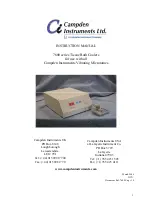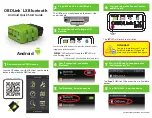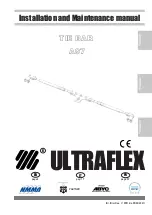
Page 3 of 7
70
– A Aleph Dr.
Newark, DE 19702
Support Email:
Toll Free Number: 1-800-AIRSLED (1-800-247-7533)
Figure 7
OPERATING YOUR AIRSLED
•
Once the air beams are in position and all connections
are snug, you are ready to plug your system into a
grounded electrical outlet.
•
Strap the blower comfortably over your shoulder and
engage the power switch.
•
BE PREPARED
to brace and control the load once your
Airsled system is activated. Using both hands to control
and maneuver the load at all times is recommended. See
figure 5.
CONTROL AND MANEUVERABILITY
•
All Airsled systems have an air flow controller. See figure 6. By fully opening
the controller, less air will flow into the air beams. This can help reduce the lift
especially in situations where overhead clearance is limited (e.g., less than
2
”).
•
When overhead clearance is
less than 2
”,
the load may get “wedged” in
place once it is lifted by the air beams. Overhead with less
than 2” clearance may also get damaged when the load is
lifted. If fully opening the air flow controller does not resolve
this issue, you can rapidly toggle the power switch between
the ON/OFF positions. This will partially inflate the air beams
allowing you to slowly move the load.
WARNING
– this
toggle approach requires two operators and should be done
using extreme caution to avoid injury or damage.
•
Systems with dial-controlled,
VARIABLE SPEED
performance. (see
figure 7) can have the rate and height of air beam inflation controlled
making the load less likely to get wedged due to tight, overhead
clearance. If clearance is less than 1”, it is recommended you turn up the
air flow gradually.
•
Tilting
may occur if the load is not optimally positioned over the air beams
(e.g., object is up against a wall and air beams only extend slightly through
the rear). If the load tilts away from you, you can use your foot and press
the edge of the air beams and apply downward pressure to offset the tilt.
See figure 8. If the load tilts toward you, the air beams may be pushed
under too far and will need to be pulled back. If the load tilts to the side, you
may need to shift one or both of that air beams to offset the tilt.
GOING OVER POROUS SURFACES SUCH AS CARPETING
All Airsled systems come with plastic Rough Surface Adapters (RSAs). The RSAs are 8
” W x 36” L and
laid on top of the porous surface, such as a carpet. The air beams MUST BE PLACED OVER THE RSAs
in order for your system to perform properly. See figure 9. Your system comes with 4 RSAs allowing you
to create a short track to move the load. If moving the load over long distances, heavy carboard paper
such as Ram Board
®
floor protection paper can be used. See figure 10.
Figure 6
Figure 5
Figure 8

























